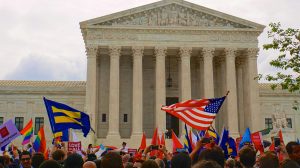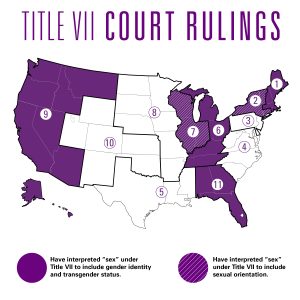States should take action as SCOTUS prepares to hear LGBT discrimination cases
States and localities should prioritize protecting sexual orientation and gender identity as concerns rise over the likelihood that the Supreme Court will uphold protections for LGBT individuals.
By Aastha Uprety and Kate Scott
May 9, 2019
 A crowd gathers in front of the Supreme Court holding American flags and marriage equality flags.
A crowd gathers in front of the Supreme Court holding American flags and marriage equality flags.
The Supreme Court of the United States (SCOTUS) has agreed to hear three cases next term regarding employment discrimination against LGBT individuals. Beginning in October, the justices will review these cases and issue decisions that could have major implications for the well-being of LGBT Americans. Advocates are concerned about the impact of forthcoming rulings on LGBT individuals given the current makeup of the court. However, state legislators have the unique opportunity to play a leading role in protecting rights for LGBT individuals over the next year and beyond.
Legal Context – What is Title VII?
Currently, there is no federal law that explicitly protects people against discrimination on the basis of sexual orientation or gender identity. Furthermore, such discrimination is not explicitly illegal in many states. In spite of this, LGBT rights advocates have advanced important legal arguments that prohibitions against sex discrimination in existing federal laws cover sexual orientation and gender identity as well.
The arguments in each case taken up by SCOTUS revolve around Title VII of the Civil Rights Act of 1964. Title VII protects against employment discrimination on the basis of sex, which advocates have argued, by definition, also applies to gender identity and sexual orientation, two categories that are not explicitly mentioned in the Act.
The legal argument relies on the claim that an action or type of treatment is discriminatory if such treatment would be different “but for” that person’s sex. In the context of sexual orientation, the 2nd Circuit Court explained the connection as such: “A woman who is subject to an adverse employment action because she is attracted to women would have been treated differently if she had been a man who was attracted to women.” Thus, advocates argue that sexual orientation discrimination is a subset of sex discrimination. Similarly, transgender individuals face discrimination when their gender presentation does not conform with the sex they were assigned at birth, and thus suffer from discrimination based on sex stereotypes, which advocates have argued should be understood as sex discrimination.
The 1st, 6th, 7th, 9th, and 11th Circuit Courts have issued rulings that expand the interpretation of “sex” in Title VII to include gender identity and transgender status, and the 2nd and 7th Circuits have ruled that this protection against sex discrimination covers sexual orientation.
 This map displays the geographic boundaries of the Circuit Courts in the U.S. and shows which have expanded Title VII to include sexual orientation and/or gender identity.
This map displays the geographic boundaries of the Circuit Courts in the U.S. and shows which have expanded Title VII to include sexual orientation and/or gender identity.
Of the three relevant cases admitted by the Supreme Court, two involve questions of sexual orientation and one involves gender identity.
Sexual Orientation:
Altitude Express v. Zarda and Bostock v. Clayton County
Both cases rely on Title VII to argue that the firing of a gay employee violated the Civil Rights Act. In Altitude Express v. Zarda, employee Donald Zarda reported that his former employer, a skydiving company called Altitude Express, discriminated against him on the basis of his sexual orientation when it fired him after he disclosed that he was gay to a customer. The defendants, Altitude Express, appealed this case to the Supreme Court, unhappy with the 2nd Circuit’s ruling that the sex discrimination clause of the Civil Rights Act is indeed applicable to sexual orientation. Consistent with the Trump administration’s hostility toward equal treatment of LGBT individuals, the Department of Justice (DOJ) under Attorney General Jeff Sessions issued an amicus brief in support of Altitude Express, stating that Title VII does not extend discrimination protections to include sexual orientation. The 2nd Circuit rejected this argument in their ruling.
In Bostock v. Clayton County, the plaintiff Gerald Bostock claims his employer fired him after finding out he was gay. Bostock appealed the case after the 11th Circuit Court dismissed his case, unlike the 2nd Circuit’s ruling in favor of Zarda. Because the two cases address the same legal issue, this case has been consolidated with Altitude Express. The cases will be combined into one proceeding and heard together by SCOTUS.
Gender Identity:
RG & GR Harris Funeral Homes v. EEOC
This case also involves expanded interpretations of Title VII’s applicability, but this time on the basis of gender identity. In this case, a transgender woman, Aimee Stephens, was fired from her job at a funeral home after informing her employer that she was transgender. The 6th Circuit Court ruled that this violated Title VII’s prohibition on sex discrimination, stating that the clause does in fact cover gender identity. R.G. and G.R. Harris Funeral Homes appealed the case to the Supreme Court.
In October 2018, the DOJ submitted a brief in support of Harris Funeral Homes to the Supreme Court stating, just as they did in the Zarda case, that Title VII should not be interpreted as protecting against other subsets of discrimination, including on the basis of gender identity. The Equal Employment Opportunity Commission (EEOC) is representing Stephens in this case, which commenced under the Obama Administration. Although the EEOC still supports LGBT advocates’ interpretation of Title VII, the Trump administration’s DOJ has authority over the agency in representing the federal government’s views.
The future of LGBT anti-discrimination protections
Many experts agree that the current Court likely would not attempt to protect the rights of LGBT individuals in these cases. The replacement of Justice Anthony Kennedy with Brett Kavanaugh, whose record on LGBT rights has been questioned by leading civil rights organizations, may play a pivotal role in overturning the favorable circuit court decisions affirming that Title VII prohibits discrimination on the basis of sexual orientation and gender identity (i.e., the 2nd and 6th Circuit’s rulings on Zarda and Harris Funeral Homes).
Despite this, there is still hope for securing additional LGBT rights in the United States. Some states and localities have their own laws that explicitly protect individuals against discrimination on the basis of sexual orientation and/or gender identity. Twenty-two states explicitly prohibit discrimination in housing, employment, and public accommodations based on sexual orientation, and 20 do so for gender identity.
Because the above cases will not be heard until next term, SCOTUS may not issue rulings until June 2020. Thus, state legislatures, many of which have their legislative sessions in the first few months of the calendar year, have one more chance to pass explicit anti-discrimination protections for LGBT people and protect their residents from any negative rulings SCOTUS may issue.
At least two states attempted to pass such laws this past year. In 2019, anti-discrimination bills made their ways through the Virginia and Florida legislatures, but both bills ultimately failed. In Virginia, SB 998 would have banned discrimination against public employees on the basis of sexual orientation and gender identity. It successfully passed the Senate but did not make it out of the House of Delegates after it was removed from the agenda of the Committee on General Laws. In Florida, the Florida Competitive Workforce Act (FCWA) would have added sexual orientation and gender identity as protected classes under the Florida Civil Rights Act. However, House and Senate leadership did not give the bill a hearing.
The lack of protections against discrimination for LGBT workers means that they have little legal recourse in the case of mistreatment. A recent testing investigation by the ERC in Virginia uncovered evidence of possible discrimination against gay and queer job applicants, supplementing existing self-reported data that 21 percent of LGBT workers have faced workplace discrimination. While circuit court rulings that clarify existing laws extend federal employment protections to LGBT individuals are important, they provide an inconsistent patchwork of protections for LGBT workers. This is not enough to protect the livelihoods of workers, many of whom struggle to find jobs, face harassment in the workplace, or have been fired for being gay or transgender.
In the current political climate, state-level protections may be one of the most effective methods for securing LGBT employment rights before the Supreme Court can potentially undo years of progress advocates have achieved through a litigation strategy in federal courts. The Supreme Court’s decision to review cases that involve Title VII’s protections for LGBT individuals is concerning, and legislatures around the country should work quickly to pass protective explicit anti-discrimination laws before any harmful rulings can be issued by the Court next year.

